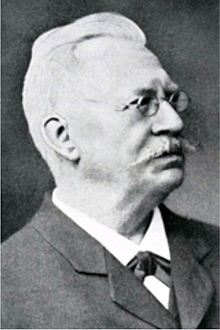Ludwig Beck (industrialist)
Ludwig Georg Ernst Wilhelm Beck (born July 10, 1841 in Darmstadt , † July 23, 1918 in Biebrich ) was a German metallurgist and ironworker , he was the owner of the Nassauische Rheinhütte.
Life
Beck, among his ancestors were university professors, senior officers and civil servants in the Hessian-Darmstadt ministries, and after completing a chemistry degree in Heidelberg , he did his doctorate in 1861 with Robert Bunsen . He gained further theoretical experience until 1863 at the Bergakademien Freiberg and Leoben . In Freiberg he joined the Corps Franconia and in Leoben the Corps Tauriscia. He gained practical experience in mining and smelting works on the Lahn and in the Henrichshütte Hattingen. In 1864 and 1865 he was assistant to John Percy at the Royal School of Mines in England. In 1865 he returned to Germany and was until 1867 as blast furnace engineer in Altenhundem active, held in Darmstadt and Frankfurt lectures and two years later (March 1, 1869) he acquired Nassauische Rheinhütte he received from a blast furnace operation to a successful cupola foundry rebuild let. In the Villa Beck bought in 1898 in Biebrich, today's district of Wiesbaden , in addition to his entrepreneurial activity, he completed his major five-volume work "The history of iron in technical and cultural-historical relationships" , in which he not only describes the technology itself, but also describes their impact on society. This work and other publications earned him the appointment of professor on May 12, 1905, the Carl Lueg commemorative coin of the Association of German Ironworkers in 1909 and the appointment of Dr. Ing. Hc as an honorary doctorate from RWTH Aachen University . His years of research on the history of the Nassau iron industry , which had not been completed, were continued by the Prussian State Archives Director Hans Schubert and published in 1937.
His wife Bertha Beck (née Draudt) came from a Hessian family of lawyers. The middle of his three sons was Colonel General Ludwig Beck , who was involved in the assassination attempt on Adolf Hitler on July 20, 1944 . His brother Theodor Beck , two years older than him , became a partner in a machine factory in 1867 and devoted himself to the history of mechanics and mechanical engineering. His third brother Friedrich embarked on a military career and published regimental histories.
literature
- Hugo Racine: Ludwig Beck. In: New German Biography (NDB). Volume 1, Duncker & Humblot, Berlin 1953, ISBN 3-428-00182-6 , p. 698 f. ( Digitized version ).
- Hans-Ulrich Textor: Freiberg Corps students in Leoben. In: then and now. Yearbook of the Association for Corpsstudentische Geschichtsforschung eV Vol. 43, 1998, ISSN 0420-8870 , pp. 311–321, here p. 317.
- Ludwig Beck: history of iron. Volume I – V, Braunschweig 1884–1902.
- Wolfhard Weber : Ludwig Beck and the history of iron . stahl und eisen 135 (2015) No. 5, pp. 107–110.
Web links
- Literature by and about Ludwig Beck in the catalog of the German National Library
- Beck, Ludwig Georg. Hessian biography. (As of March 12, 2013). In: Landesgeschichtliches Informationssystem Hessen (LAGIS).
- Entry on Ludwig Beck in the Rhineland-Palatinate personal database
Individual evidence
- ↑ See works (as digital copies and full text) by Ludwig Beck (industrialist) in the German Text Archive .
- ^ Theodor Beck: Contributions to the history of mechanical engineering . Berlin 1899; further articles in the VDI magazine .
| personal data | |
|---|---|
| SURNAME | Beck, Ludwig |
| ALTERNATIVE NAMES | Beck, Ludwig Georg (full name) |
| BRIEF DESCRIPTION | German metallurgist and mining entrepreneur, owner of the Nassauische Rheinhütte |
| DATE OF BIRTH | July 10, 1841 |
| PLACE OF BIRTH | Darmstadt |
| DATE OF DEATH | July 23, 1918 |
| Place of death | Biebrich |
